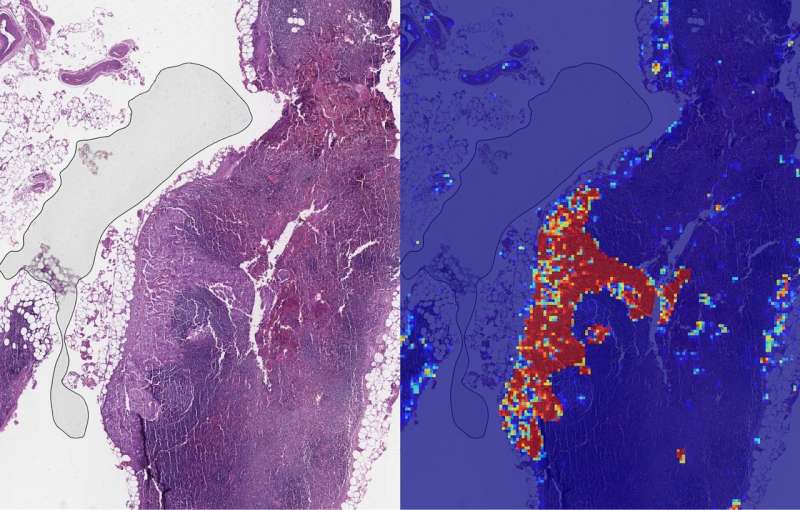October 17, 2018 weblog
Google researchers see progress in tool to detect breast cancer spread

Spotting breast cancer is something that Google AI is good at doing. How good? An Ubergizmo headline: "Google Claims Its AI Has 99% Accuracy In Detecting Metastatic Breast Cancer." What's behind the headline?
The answer is that the firm has a deep-learning tool that in tests was able to distinguish metastatic cancer 99% of the time—which amounts to a greater accuracy rate than achieved by human pathologists.
Why that matters: "Cancer is one of those instances where early detection can lead to a higher survival rate," commented Tyler Lee in Ubergizmo. Kyle Wiggers, who covers AI for VentureBeat, similarly drove the point home that metastatic cancers were "notoriously difficult to detect."
Wiggers looked at some stats and wrote that "of the half a million deaths worldwide caused by breast cancer, an estimated 90 percent are the result of metastasis." Now Google's technology aims to play a helpful role in detection.
Posting in the Google AI Blog on Oct. 12, Martin Stumpe, technical lead and Craig Mermel, product manager, Healthcare, Google AI, underscored the importance of timing.
"Detection of nodal metastasis is relevant for most cancers," they wrote, and, in breast cancer, "nodal metastasis influences treatment decisions regarding radiation therapy, chemotherapy, and the potential surgical removal of additional lymph nodes. As such, the accuracy and timeliness of identifying nodal metastases has a significant impact on clinical care."
Lee reported that the researchers tested their AI "against the Lymph Node 2016 challenge dataset which contains 399 whole-slide images of lymph node sections from the Radboud University Medical Center and the University Medical Center Utrecht." Result: 99.3% score in accuracy. Yes, 99.3 is not 100 as it did occasionally misidentify things. Nonetheless, the 99.3% score was "better compared to a practicing pathologist tasked with evaluating the same slides," Lee wrote.
MIT Technology Review, "The Download," similarly pointed out that "The 99% rate is superior to the performance of human pathologists."
Wiggers had more details. "In tests, it achieved an area under the receiver operating characteristic (AUC)—a measure of detection accuracy—of 99 percent. That's superior to human pathologists, who according to one recent assessment miss small metastases on individual slides as much as 62 percent of the time when under time constraints."
Add a drumroll for open source. The technology is based on an open source image recognition deep learning model. It is Inception V-3. Their AI system, meanwhile, is called Lymph Node Assistant, or LYNA. Joseph Archer, The Telegraph, said that the Google AI was taught to recognize the characteristics of tumors "by studying scans from cancer patients."
As for next steps, the researchers acknowledged what they achieved—and what remains to be achieved.
"With these studies, we have made progress in demonstrating the robustness of our LYNA algorithm to support one component of breast cancer TNM staging, and assessing its impact in a proof-of-concept diagnostic setting."
However, "the bench-to-bedside journey" is a long one, they said, and these studies have limitations, "such as limited dataset sizes and a simulated diagnostic workflow which examined only a single lymph node slide for every patient instead of the multiple slides that are common for a complete clinical case."
They stated that further work is necessary to assess the impact of LYNA on real clinical workflows and patient outcomes.
MIT Technology Review The Download, addressed possible fears that technology like this seeks to replace human practitioners. It's not a case of either-or. A diagnosis is only one facet of doctor-patient care, followed by a plan of action. The Google AI effort is and-and.
"Rather than replacing humans, this technology is more likely to complement their skills," said The Download, "making it easier and quicker to diagnose metastatic tumors. In one study, the algorithm halved the time it took to check a slide on average, cutting it to just one minute per slide."
More information: Google AI Blog: ai.googleblog.com/2018/10/appl … g-to-metastatic.html
Yun Liu et al. Artificial Intelligence–Based Breast Cancer Nodal Metastasis Detection, Archives of Pathology & Laboratory Medicine (2018). DOI: 10.5858/arpa.2018-0147-OA
David F. Steiner et al. Impact of Deep Learning Assistance on the Histopathologic Review of Lymph Nodes for Metastatic Breast Cancer, The American Journal of Surgical Pathology (2018). DOI: 10.1097/PAS.0000000000001151
© 2018 Tech Xplore



















